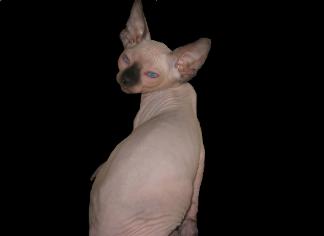

| BareMews |
| Bald and Beautiful Sphynx Cats |
| HCM is a common cardiac condition and is the most common heart disease in cats. HCM is an acquired disease that most often affects middle-age cats, but has been seen in very young cats as well. Although it develops and progresses over time, it's early signs may be subtle or nonexistent. A cat that seems healthy may appear to become very ill, very quickly, or even die suddenly after developing a blood clot in the heart, having displayed no symptoms of ill-health. A cat’s heart that is affected by HCM will have thickened left ventricle walls. Rather than growing larger outwardly, the walls of the heart grow inward, restricting the amount of blood that can be pumped through the ventricle. As the condition worsens, it becomes increasingly difficult for the heart to perform its job and the heart eventually fails. Symptoms of HCM Many cats with HCM are never diagnosed as having the condition until it is too late – that is, after death, during a necropsy. The reason for this is that the disease often displays no symptoms at all, or exhibits symptoms that can be easily mistaken for other conditions. However, the following symptoms, if seen frequently in your cat, should be taken very seriously as they can be indicative of HCM: Causes of HCM So far, the cause of Feline Hypertrophic Cardiomyopathy is unknown; however some studies suggest it to be genetic. Certain breeds appear to be more commonly afflicted. If a veterinarian believes a cat to be at risk for the condition, he or she may recommend that further screening be undertaken, preferably with a Board Certified Veterinarian Cardiologist. Scanning for HCM An echocardiogram, an ultrasound of the heart, is the best method of detecting HCM. An echocardiogram can be an expensive test, often costing upwards of $600 at a veterinarian’s office, but it is vitally important if HCM is suspected and as a preventative tool in a breeding program. Scanning for HCM is such an important tool in trying to eliminate this disease or greatly reduce incidence of it from the Sphynx gene pool. We strongly recommend that all adult Sphynx in Breeding Programs be scanned annually and that Adult Pet Sphynx be scanned every 2-3 years. While the long-term prognosis for cats afflicted with this incurable disease is not good, early detection via an echocardiogram and treatment with medication can considerably slow the progression of the disease, leading to many, many great years with your cat. Further and more importantly, scanning and catching this disease early will help prevent further generations of HCM positive Sphynx from being born by spaying and neutering HCM positive breeders. All pet parents and breeders should be aware of this deadly disease. We encourage all potential new Sphynx parents to only support responsible breeders that are scanning their breeding cats. |
- Heart murmur
- Lethargy
- Poor appetite
- Panting, or labored breathing without exertion
- Weakness or paralysis of the back legs
| All of our Sphynx at BareMews, are scanned for Heart Disease starting at around 1yr of age and annually thereafter. We use and HIGHLY recommend Board Certified Veterinary Cardiologist, Scott Forney, DVM, DACVIM Cardiology and his wonderful staff at LAS VEGAS VETERINARY SPECIALTY CENTER. Please give them a call if you're having your cat scanned in the Las Vegas, Nevada area. |
Copyright 2007-2021 BareMews Sphynx. All rights reserved.
| 8650 W. Tropicana Ave., Suite B-107 Las Vegas, NV 89147 cardiology@lvvsc.com Ph: 702-871-1152 Fx: 702-262-7000 www.lvvsc.com |
